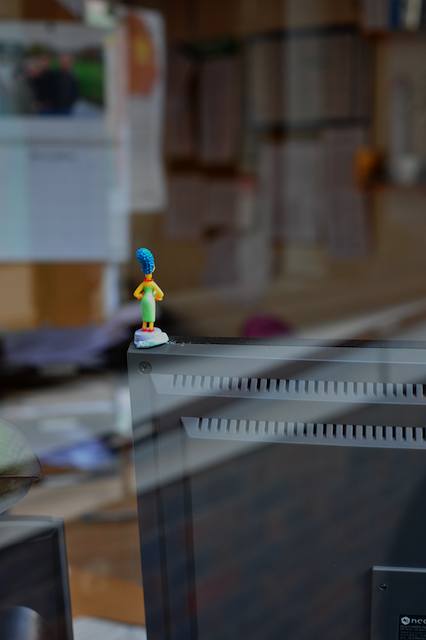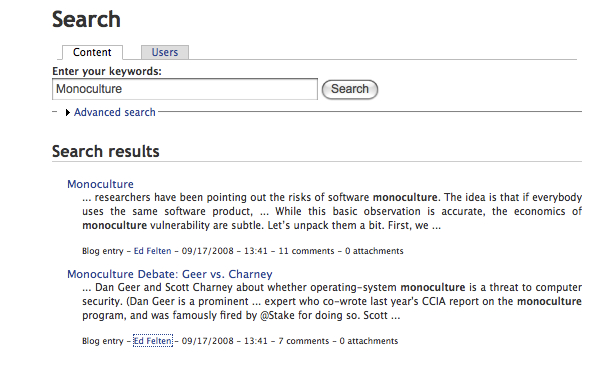… in 1954, the United States Senate voted to condemn Sen. Joseph R. McCarthy, R Wis., for “conduct that tends to bring the Senate into dishonor and disrepute.”
Jamie Boyle’s new book is out

Hurrah! And available as a pdf download as well as through the usual channels.
Yellow Peril

Doh!

Seen in a colleague’s office through her window.
Lighting up time

Puzzled? I would be too if I didn’t know the context. It’s an uplighter cunningly inserted in a distressed Art Deco mirror.
Photographed in a nice Cambridge restaurant last night.
Speed Bumps Ahead
In the next few days Memex will be moving to a new server and an updated version of WordPress, so service may be patchy for a day or two. Apologies in advance.
Gladwell debunked
I enjoy Malcolm Gladwell’s writing. But anyone who can get $30,000 for an appearance has to be riding for a fall. Today, Andrew Orlowski has a go. Knockabout stuff.
Have you ever had the nagging sense that there’s something not quite right with the adulation that follows Malcolm Gladwell – the author of Tipping Point? But you couldn’t quite put your finger on it? We’re here to help, dear reader.
Gladwell gave two vanity “performances” in the West End – prompting fevered adulation from the posh papers – the most amazing being this Guardian editorial, titled In Praise of Malcolm Gladwell.
It appears that we have a paradox here. A substantial subclass of white collar “knowledge workers” hails this successful nonfiction author as fantastically intelligent and full of insight – and yet he causes an outbreak of infantalisation. He’s better known for his Afro than any big idea, or bold conclusion – and his insights have all the depth and originality of Readers Digest or a Hallmark greeting card. That’s pretty odd.
So what’s really going on here? Who is Malcolm Gladwell? What’s he really saying? Who are these people who lap it all up? And what is it that he’s saying that hold so much appeal?
Orlowski coins a memorable term of abuse. Gladwell, he says, is a walking version of ‘Reader’s Digest 2.0’. Ouch!
Writing by candlelight
We had a power cut today. Our house — and indeed the entire village — was without electricity from before noon until late afternoon. Sobering experience. And a salutary reminder of how much our lives depend on stable electricity supplies. Basically, nothing in our house worked: no lighting; no heating; no cooking; no hot water; no TV; no broadband; no chargers for mobile phones. I lit a blazing log fire, so we wouldn’t have frozen, and we could always have gone out to restaurant if there had been no power for cooking. As I say, sobering. And also a reminder of why, global warming or not, no democratic government is going to allow electricity supplies to falter. So we’ll have nukes, or whatever else it takes to keep the lights on.
Dr Internet
This morning’s Observer column
A detailed academic study some years ago estimated that 4.5 per cent of all internet searches were health-related, which at the time translated into 16.7 million health-related queries a day. Again, I’m sure that number has gone up.
All of which suggests that people worry a lot about their health and see the web as a great way of becoming better informed. The medical profession is, to put it mildly, not over the moon. The more literate practitioners shake their heads and quote Mark Twain’s adage: ‘Be careful about reading health books. You may die of a misprint.’ But others are more righteous and wax indignant about what they see as the errors and misinformation peddled by many sites that purport to deal with health issues…
LATER: I had a moving email from a correspondent who lives on the other side of the world. I’m quoting it verbatim except that I’ve anonymised it.
In 2005, my second son, arrived in a hurry. We were living in Southern Japan at the time.
Following what had been another wonderful pregnancy, my wife and I were not at all prepared for the shock of his arrival and his condition.It turned out our son was born with congenital cytomegalovirus. Once I learned the name of what it was that had ravaged his body, I obviously turned to the Internet, including PubMed. Alright, so I am familiar with research, indices, journals et cetera, I was at the time an Associate Prof., and I am fairly well read. So perhaps I am not your average punter, but nevertheless within 24hrs I had read almost all there was on the research and treatment of cCMV.
The good folks at the National hospital, had similarly gone off to look this one up. But their research was almost entirely based on what was in-print in Japanese.
We had both come to similar, but not identical conclusions. One, and only one treatment was available, a chemotherapy over the course of 6 weeks may save his sight and his hearing. The Registrar wanted to begin immediately. I said No.
I had read about the dangers of the chemo in seriously compromised infants, and through the internet had managed to reach doctors at Mayo, U. of Alabama, Melbourne Sick Kids, Sydney Royal, and Great Ormond Street, never mind almost 100 parents of kids with cCMV, through a list-serv.The overwhelming advice, albeit guarded, and with lots of back-out clauses, essentially said, ‘Wait, let the infant recover from the trauma of birth, treat some of the minor conditions, and in a week or so’s time – then start the chemo. If you start it now – he will die.’.
It was a very hard call – going against the doctor’s advice in Japan. But I did. To say they were not happy is a bit of an understatement. I subsequently moved my son a few days later to a newer prefectural hospital, and another NICU team.
He began the chemo course at 10 days old, in a much stronger condition, and he got through it. He can see, and despite being told he was going to be severely deaf, he can hear.While I could have rung around using old fashioned telephones, there is no way I could have been as informed, and armed with knowledge without the Internet.
I have no doubt it saved his life.
My son is now 3, and is truly the happiest child you could care to meet.
STILL LATER: Jeff Jarvis picked up on the column and added:
In my book, I argue that – as with other apparent problems in industries – there is opportunity here. Doctors should act as curators, selecting the best information for their patients and making sure they are better informed.
Missing links at Princeton
For years Ed Felten of Princeton has been one of the best (most thoughtful, smart, informed, perceptive) bloggers on the Web. His Freedom to Tinker, has become a must-read for me and thousands of others. But in recent times, Freedom to Tinker has morphed from Professor Felten’s personal property into a collective blog hosted by Princeton’s Center for Information Technology Policy, a research centre devoted to the intersection of digital technologies and public life. The blog now publishes comment and analysis written by the Centre’s faculty, students, and friends.
All of which is fine and dandy. There’s still lots of great stuff on Freedom to Tinker. But in the process of morphing from a personal space to a collective blog, Professor Felten’s archive seems to have gone awol. The result is that all the links I have to his writings — and use in my teaching and journalism — no longer work.
The problem applies inside the blog itself also. For example, its search engine returns two of the archive entries to which I had linked.

But when one clicks on either link, one is taken to the top page of the blog. So it seems that deep linking to content on Freedom to Tinker has effectively been disabled.
This is the kind of thing one expects from clueless media organisations. But one would have thought that Princeton was a cut above that.
